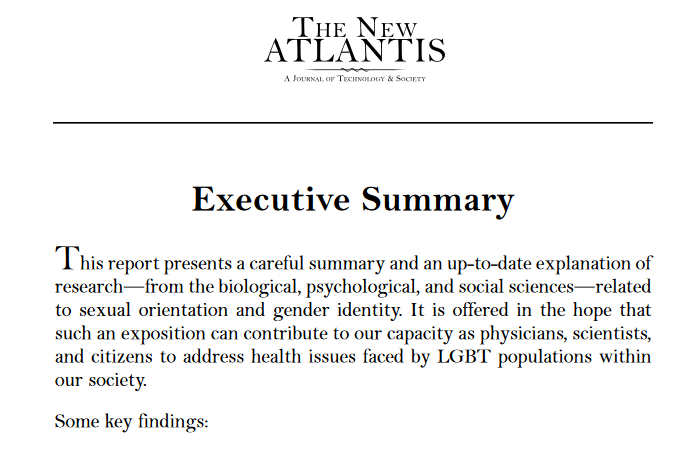A new study in the United States says that homosexuals are not ‘Born that Way’ as sexual orientation as an innate, biologically fixed property of human beings—the idea that people are “born that way”—is not supported by scientific evidence.
The 144-page study is written by Dr. Lawrence Mayer from the Department of Psychiatry at Johns Hopkins School of Medicine and Dr. Paul R. McHugh who is a renowned psychiatrist and former chief of psychiatry at Johns Hopkins Hospital.
Link to the Executive Summary of the Study

![]() Homosexual Study New Atlantis Executive Summary
Homosexual Study New Atlantis Executive Summary
Excerpts:
Part One: Sexual Orientation
- The understanding of sexual orientation as an innate, biologically fixed property of human beings—the idea that people are “born that way”—is not supported by scientific evidence.
- While there is evidence that biological factors such as genes and hormones are associated with sexual behaviors and attractions, there are no compelling causal biological explanations for human sexual orientation. While minor differences in the brain structures and brain activity between homosexual and heterosexual individuals have been identified by researchers, such neurobiological findings do not demonstrate whether these differences are innate or are the result of environmental and psychological factors.
Part Two: Sexuality, Mental Health Outcomes, and Social Stress
- Compared to the general population, non-heterosexual subpopulations are at an elevated risk for a variety of adverse health and mental health outcomes.
- Members of the transgender population are also at higher risk of a variety of mental health problems compared to members of the non-transgender population. Especially alarmingly, the rate of lifetime suicide attempts across all ages of transgender individuals is estimated at 41%, compared to under 5% in the overall U.S. population.
There is evidence, albeit limited, that social stressors such as discrimination and stigma contribute to the elevated risk of poor mental health outcomes for non-heterosexual and transgender populations.
Part Three: Gender Identity
- The hypothesis that gender identity is an innate, fixed property of human beings that is independent of biological sex—that a person might be “a man trapped in a woman’s body” or “a woman trapped in a man’s body”—is not supported by scientific evidence.
- According to a recent estimate, about 0.6% of U.S. adults identify as a gender that does not correspond to their biological sex.
- There is little scientific evidence for the therapeutic value of interventions that delay puberty or modify the secondary sex characteristics of adolescents, although some children may have improved psychological well-being if they are encouraged and supported in their cross-gender identification. There is no evidence that all children who express gender-atypical thoughts or behavior should be encouraged to become transgender.
Undoubtedly, these modest and tentative findings will be hotly contested. In any case, biological sexual identity rather than alleged socially constructed gender identity should be decisive in determining one’s identity. Christians are not convinced by social scientists who promote their claim that one’s gender is socially constructed as the purported data proposed by social sciences is theory-laden and influenced by subjective interpretations. Furthermore, even the more experimental scientific investigations on gender face inherent limits since it is impossible to draw any precise and conclusive judgment on the causal relationship between nature (genes), nurture (social influence) and social behavior (choice of sexual identity).
Finally, it is crucial for Christians in the debate on sexuality and gender to go beyond merely affirming God’s moral law when they follow the Bible which considers homosexual practice to be a sinful act (along with a long list of arguably more pervasive and harmful sinful human acts given in the book of Romans chapter 1, which many Christians conveniently ignore). They need to demonstrate the wisdom of God’s moral laws for the quest of personal fulfilment and the flourishing of human society. The message of Christians will have more credibility when heterosexual marriages among Christians are genuinely wholesome and beautiful.
Related Article: Disney’s Delicate Homosexual Moment